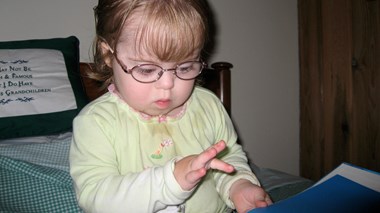
People sometimes ask me what I've "done right" with Penny. They ask because Penny reads and goes to ballet class and practices piano and orders her own meal when we eat at a restaurant. They ask because she is "high functioning." I suspect many people assume we've coached her well or stimulated her brain with special gizmos or put in hours of hours of extra therapy. We've certainly done our best, and I couldn't be more grateful for the therapists and doctors who have helped and advised us along the course of her life. But I know plenty of parents who have done more for their kids and whose kids don't appear, from the outside, as capable as Penny. The only thing I am willing to say that we have "done right" is to smile at her. To take great delight in who she is.
It started when Penny was three months old. Peter and I left her at home with my mother. I brought my breast pump with me to the conference, a one-day series of inspirational and informative talks for parents of children with Down syndrome. It was there—in that crowded auditorium, filled with eager and anxious parents scribbling notes—that I heard a lecture from Dr. Gerard Mahoney about something called "Responsive Teaching."
For me, his message boiled down to this: Smile at your kid. A lot.

I'll get back to a few details, but let me first pause to say that this advice was important as far as our relationship with Penny, our oldest daughter who has Down syndrome. But it has also been important for our relationship with William and Marilee, our two other, typically-developing children. It has been important for Peter's relationships with his students. It has been important for our relationships with colleagues and family members. Most of all, perhaps, it has been important for my relationship with God.
The idea behind "Responsive Teaching" is that parents of kids with disabilities often spend a lot of time focused on their children's weaknesses. They, with the help of therapists and doctors, identify deficits in their children. Ways they don't measure up to typical kids. Things that make their life more difficult. And so they try to work on these things. The hard work is often motivated by love, but the experience of that hard work, of parent and child straining towards a difficult and sometimes impossible goal, tends to involve a lot of grimacing. Literally. Dr. Mahoney's studies have shown that parents who are trying to teach their kids these difficult tasks frown a lot. They get frustrated, the child gets upset (whether worried or sad or tired or discouraged—you name it), and a negative feedback loop begins. And it tends to repeat itself over and over again.
Responsive Teaching suggests that instead the parent (and therapist and teacher and doctor and anyone else) focus upon the children's strengths. What does your child love? Work on that. From there, two things will happen. One, many of the weaknesses will be inadvertently addressed in the meantime. Two, you and your child will enjoy yourselves. You will smile. You will feel satisfied, connected, happy. And those interactions will spiral you towards a place of confidence and hopefulness.

We've seen this work for Penny with reading. Penny has loved books from the time she could sit up and hold one in her hand. Long before she could read the words the books contained, her therapists used to marvel at how well she turned the pages. Little did I know that by doing something she loves she was also working on her fine motor skills.
Again, we've been able to apply the same concepts outside of parenting a child with Down syndrome. Looking for the strengths of my friend who is unemployed and trying to help her focus on those instead of naming all the reasons she won't get a job. For Peter, editing a high school history paper and looking for the ideas or sentences that demonstrate possibilities for growth rather than deficits in learning.

Which leads me to the ways in which I have come to see God as a responsive teacher, a responsive parent, too. For all our failings, over and over again, the message we receive throughout the Bible is that God will not give up on us. That God will always love us. That it is his love and hope for us that enables us to grow. But it's better than that. The Bible says God rejoices over his people with singing (Zeph. 3:17). That we are the joy set before Jesus, for which he was willing to endure the cross (Hebrews 12:2). That God makes his face shine upon us (something the people prayed for throughout the Psalms, among other places in Scripture).
We can see God as a teacher, a king, even a therapist, counseling, guiding, helping us become better people. But love is the core of God's being, and we are the ones who receive that love. God smiles when he sees us.
Little did I know, eight years ago, that loving my daughter well meant delighting in her. And little did I know how much my Father delights in me.
Support our work. Subscribe to CT and get one year free.
Recent Posts

The Best Parenting Advice I Ever Received
The Best Parenting Advice I Ever Received
The Best Parenting Advice I Ever Received
The Best Parenting Advice I Ever Received
















